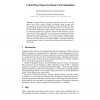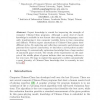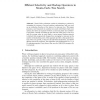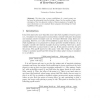CG
2006
Springer
15 years 3 months ago
2006
Springer
In this paper we explore the tactical aspects needed for the creation of an intelligent computer-pool player. The research results in three modifications to our previous model. An ...
CG
2006
Springer
15 years 4 months ago
2006
Springer
109
Voted
CG
2006
Springer
15 years 4 months ago
2006
Springer
In the last decade, proof-number search and Monte-Carlo methods have successfully been applied to the combinatorial-games domain. Proof-number search is a reliable algorithm. It re...
143
Voted
CG
2006
Springer
15 years 4 months ago
2006
Springer
We apply Monte Carlo simulation and alpha-beta search to the card game of Skat, which is similar to Bridge, but different enough to require some new algorithmic ideas besides the t...
CG
2006
Springer
15 years 4 months ago
2006
Springer
CG
2006
Springer
15 years 4 months ago
2006
Springer
Abstract. A one-player, finite, probabilistic game with perfect information can be presented as a bipartite graph. For one-player Can't Stop, the graph is cyclic and the chall...
CG
2006
Springer
15 years 4 months ago
2006
Springer
This paper presents SAFETY SOLVER 2.0, a safety-of-territory solver for the game of Go that can solve problems in areas with open boundaries. Previous work on assessing safety of t...
CG
2006
Springer
15 years 4 months ago
2006
Springer
Monte-Carlo evaluation consists in estimating a position by averaging the outcome of several random continuations, and can serve as an evaluation function at the leaves of a min-ma...
97
Voted
CG
2006
Springer
15 years 4 months ago
2006
Springer
We show that a proper equilibrium of a matrix game can be found in polynomial time by solving a linear (in the number of pure strategies of the two players) number of linear progra...
CG
2006
Springer
15 years 4 months ago
2006
Springer
While recently the strength of chess-playing programs has grown immensely, their capability of explaining in human understandable terms why some moves are good or bad has enjoyed l...





